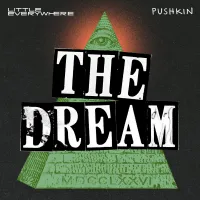Multi-Level Marketing (MLM). Pyramid scheme. Independent sales associates and business owners. We've all heard of these "opportunities," often from someone offering to help you get involved.
The Dream is a podcast series about shedding light on what's really going on in these systems.
Full disclosure right up front - I used to work for Amway, which is a multi-level marketing business. In the IT department, not the marketing part, but you can't work in any capacity at Amway without being aware of the business model. I'm pretty sure I signed something at some point that prevents me from talking about any details of how they operate, and I don't really want to do so anyway, but I can certainly talk about my own reactions and feelings as I learned how the business works. More on this later.
The Dream starts off in its first episode with an incredibly obvious scam. No product selling, no fig leaf of running a business. Just people paying money to attend feel-good "airplane" sessions, after which you could recruit more people to attend your own sessions where you are the "pilot." Straight up Ponzi scheme, which eventually collapsed as they all do.
Then the hosts move on to the real subject in later episodes - the more complex and nuanced businesses that add all the trappings of sales and marketing to the same basic idea. Buy in with time and/or money - usually lots of money - then recruit more people to do the same, who in turn do their own recruiting. The resulting structure is where you get the term pyramid scheme, though you really don't want to use that word around anyone involved in such a business. It's a running joke around town near the Amway headquarters that no one says "the P-word" and I suspect it's the same with all the big MLM companies.
I've made it through the first 7 episodes of the podcast (of 11, at the time I write this) and most of them spend a lot of time on the people at the bottom of the pile. The vast majority of folks who get involved, do the initial buy-in, and never go much further. Usually they can't get started on the recruiting part, which is the case when one of the producers joins an MLM business to try it out. Or maybe they do find some recruits, but find it hard to sustain the constant product sales flow - the subject of an interview with an ex-Mary Kay representative. Those people never make significant gains in the system, and often end up in quite a bit of debt from the attempt.
So why do people do it?
The Dream talks about quite a few different reasons, from psychology to secrecy to intentionally misleading promises. The idea of a way to make it big appeals to people who don't have great financial prospects, and it doesn't have to be a sure thing. You only need to look at the success of lotteries for proof, so it's not much of a stretch to realize why the idea of recruiting and selling for big bucks is appealing. In some cases, the camaraderie and social aspect of the organization are more important than the financial rewards (Mary Kay is an example of this), at least until you start actually losing significant sums. The MLM companies generally are very secretive about their financials and the success rates, so it's easy to think that you have a good chance to succeed, in spite of the reality of huge failure rates for new recruits. And the marketing from those companies can be extremely misleading, and in fact the worst excesses are outlawed here in the USA. There were some big court battles in the 1970s, and one entire episode is devoted to how those took down some companies (Holiday Magic, Koscot Interplanetary) but left others standing (Amway).
The Dream is clearly well researched and the host and producers have done a lot of legwork, which I greatly appreciate. The execution isn't the greatest podcast I've ever heard - some of the musical scoring is pretty jarring, and host Jane Marie's style doesn't particularly appeal to me. But the content is well worth the occasional less-than-ideal section of listening.
Listening to this podcast has made me do some introspection on my own thinking back when I worked at Amway. I knew it was an MLM business, and that the business model was bad for the majority of people who got into it. I'd been approached myself several times for various similar "opportunities" and always turned it down, being a (mostly) logical and mathematical thinker. The numbers simply didn't add up. So why did I decide it was OK to work for the company, effectively enabling further expansion of a model I wouldn't get involved with for myself?
The short answer is denial. I put aside the negatives and didn't think about what was happening to the "business owners" who bought in but never recouped their investment. I was certainly kept busy enough with the day-to-day of the job that it was easy not to look at the bigger picture. And the fact that incoming information almost entirely focused on the successes helped in this thought process. Just walking through the Amway headquarters, you see pictures of the successful owners, and employee newsletters and the like spotlighted those successes. On the rare occasions that I popped my head up from the minutia of my IT projects, it was easy to think only of the benefits accruing to the few, and not consider the masses that weren't making it big. And I'm confident that this is how the majority of people who work for these MLM companies think, having been there myself.
So why isn't the government stopping MLM businesses from taking advantage of people? Government regulation can help to curb the worst excesses, but it can't completely stamp out MLM, at least not if you want to maintain some kind of free market system. Plus you need a lot of political will to go after highly profitable businesses, and that's in pretty short supply. The business model is alive and well pretty much everywhere in the world, at varying levels of freedom in how they market the business. The biggest growth is in developing countries, where the promise of hitting it big is especially appealing, and government regulation is minimal anyhow.
So if not the government, is there a solution? I think the only real solution is getting people into an economic and social state where they don't
need the MLM.
The Dream makes it pretty clear that the vast majority of people who are recruited into the MLM business model do it because they feel like it's the best alternative available. If you can't get necessities like housing and food and education and health care, or if affording those necessities leaves you nothing for leisure or saving, then you're pretty susceptible to the siren song of owning a business that can really take off financially. Put people in a situation where they already have the means to live comfortably and safely, and you remove much of the appeal of the MLM model. Remove the appeal, and it collapses due to lack of new recruits.
We're nowhere near making that kind of just and equitable society available to everyone in the developed world, much less the billions of people in the still-developing economic areas. Which means that MLM companies will continue to exist, and those who recognize them for what they are need to educate others so they can avoid the pitfalls. That's what
The Dream is doing, and I commend them for it.
 The Hate U Give by Angie Thomas
The Hate U Give by Angie Thomas


























